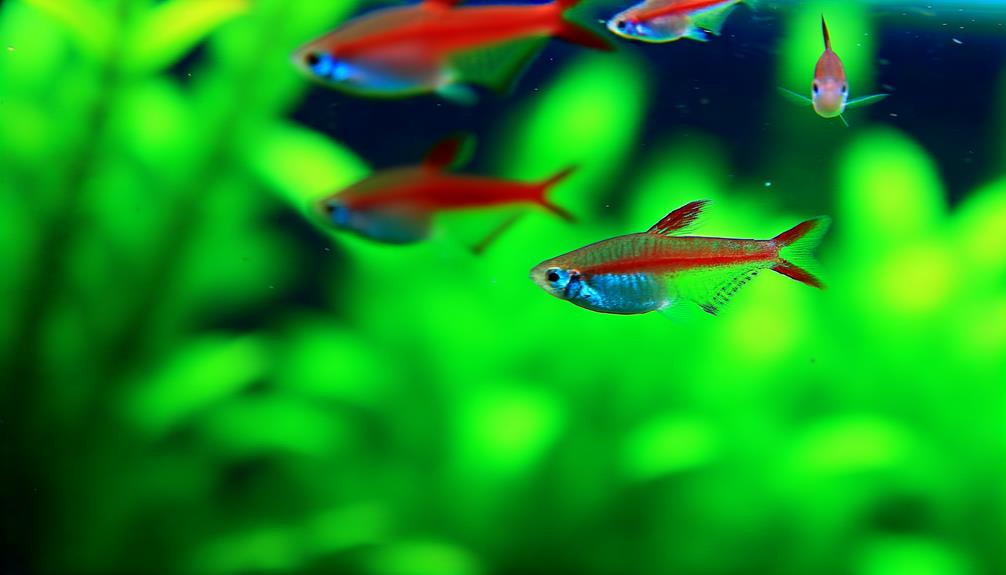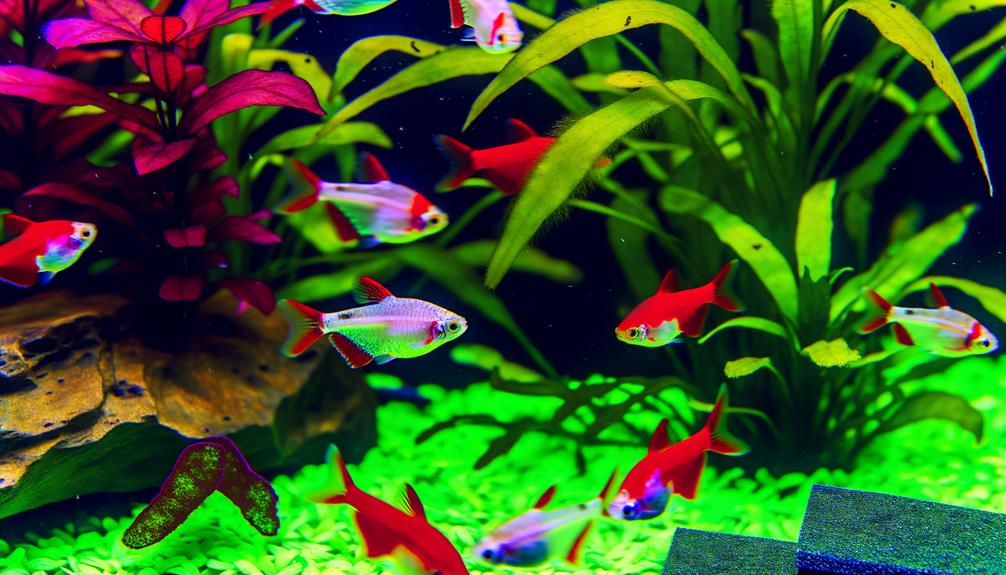How Long Can Cardinal Tetras Go Without Food?
Cardinal tetras can typically go without food for 7 to 10 days, as their metabolic rate remains stable during short fasting periods. However, keep in mind that prolonged fasting can weaken their immune system.
Ensure your tank's water quality is ideal, with appropriate pH levels and minimal ammonia, and maintain a stable temperature between 73°F and 81°F. Before any fasting period, provide a balanced diet and monitor their behavior for any signs of stress.
If you're preparing for a longer absence, automated feeders or emergency feeding solutions can help maintain their health. There are more detailed strategies to contemplate.

Key Takeaways
- Cardinal tetras can survive without food for approximately 7 to 10 days.
- Their metabolic rate remains stable during fasting periods.
- Prolonged fasting can weaken their immune system, increasing vulnerability to diseases.
- Maintaining ideal water quality and stable environments enhances their fasting endurance.
- Monitoring their behavior and health during fasting is crucial for early detection of issues.
Typical Fasting Duration

Understanding the typical fasting duration for cardinal tetras is necessary for ensuring their health and well-being. Research indicates that cardinal tetras can typically survive without food for about 7 to 10 days. During this period, their metabolic rate remains relatively stable, allowing them to rely on stored energy reserves.
You should monitor their behavior closely, as prolonged fasting can weaken their immune system and make them more susceptible to diseases. It's important to provide a balanced diet before and after any fasting period to maintain their overall health.
Factors Influencing Survival
Several factors, including water quality, temperature, and the presence of stressors, greatly influence the survival of cardinal tetras during fasting periods. You should guarantee ideal water quality by maintaining proper pH levels and minimizing ammonia and nitrate concentrations. Temperature control is essential; cardinal tetras thrive between 73°F and 81°F. Stressors, such as sudden changes in environment or aggressive tank mates, can greatly reduce their ability to endure fasting. Here's a quick reference table:
| Factor | Ideal Conditions |
|---|---|
| Water Quality | pH 6.0-7.0, low ammonia |
| Temperature | 73°F – 81°F |
| Stress Levels | Minimal |
| Tank Mates | Peaceful, non-aggressive |
| Environment | Stable, consistent |
Natural Feeding Habits

In their natural habitat, cardinal tetras primarily feed on small invertebrates, plant matter, and organic detritus found in the water column and on surfaces. They exhibit a preference for zooplankton and small crustaceans, which provide vital proteins and fats.
You'll also find them nibbling on algae and microorganisms, contributing to their nutritional diversity. Studies indicate that their varied diet helps them maintain a balanced intake of essential nutrients, necessary for their vibrant colors and overall health.
Observing their foraging behaviors, you'll notice they're active feeders, constantly searching for food sources throughout the day. This natural tendency to graze ensures they meet their dietary needs, even in environments with fluctuating food availability.
Pre-Vacation Preparations
Before you leave for vacation, it's important to plan how your cardinal tetras will be fed in your absence to guarantee their health and well-being. Scientific studies suggest that cardinal tetras can survive up to a week without food, but best care is essential.
Consider these pre-vacation preparations:
- Automated Feeders: Invest in a reliable automatic feeder to maintain consistent feeding.
- Tank Mates: Avoid adding new tank mates that might compete for food.
- Pre-Vacation Feeding: Gradually reduce feeding to mimic natural fasting periods.
- Check Water Parameters: Ensure water quality is at its peak to minimize stress.
These steps are evidence-based and aim to maintain the freedom of a stress-free vacation while ensuring your cardinal tetras stay healthy.
Emergency Feeding Solutions

When faced with an unexpected situation where your cardinal tetras need immediate nutrition, you can rely on freeze-dried or frozen foods as effective emergency feeding solutions. Freeze-dried foods retain most of their nutritional value and are easy to store. Options like bloodworms, brine shrimp, and daphnia can provide essential proteins and fats.
Frozen foods, such as mosquito larvae, offer a similar nutrient profile and are readily accepted by tetras.
To use these effectively, make sure you thaw frozen foods before feeding and crush larger particles of freeze-dried options to match the tetras' small mouths. These methods are scientifically supported to maintain your fish's health during unforeseen circumstances, giving you peace of mind in maintaining their well-being.
Monitoring Fish Health
As you ensure your cardinal tetras receive proper nutrition, observing their behavior and physical condition becomes essential in monitoring their overall health. Look for signs of stress or illness, as these can indicate nutritional deficiencies or other issues.
Key indicators to watch for include:
- Changes in color: Fading or dullness can signal poor health.
- Swimming patterns: Erratic or lethargic movements may point to stress.
- Appetite: A decrease in feeding behavior often indicates underlying problems.
- Body condition: Noting any signs of weight loss or bloating is vital.
Regular monitoring will help you make informed decisions, ensuring your tetras thrive. By staying vigilant and proactive, you can maintain a healthy environment that supports their well-being and freedom to flourish.
Conclusion
Simply put, cardinal tetras can typically fast for about a week, depending on various factors like age, health, and water conditions.
Mimic their natural feeding habits to safeguard their well-being. Before any vacation, make suitable preparations and have emergency feeding solutions ready.
Keep a close watch on their health to catch any issues early. With these steps, your tetras will remain as healthy as can be, even during short absences.






